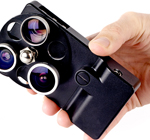
shop for groceries - far from the shop
The introduction of online shopping for groceries have seen busy, busy people clicking products on the computer screen and waiting for their things to arrive at ...
More
image . www.apopo.org .
The mighty mouse is saving lives and catching criminals. In Israel, mice is part of a bomb-detecting unit used to detect explosives at Israeli airports. An Israeli start-up company, Bioexplorers, which claims that trained mice can be better than full-body scanners and intrusive pat-downs, has invented a system using mice which can tell a genuine passenger from a terrorist carrying explosives.
A detection unit containing three concealed cartridges, each of which houses eight mice is installed in an archway. A person passes through this archway where a fan passes air into a sensor receptor, and delivers it into a chamber with several mice. The mice, having gone through intensive behavioral training, sniff the air. If the odor is one associated with items the mice have been trained to recognize, like drugs or bombs, they flee to a side chamber - setting off an alarm. To avoid false positives, more than one mouse must enter the chamber at the same time.
Unlike dogs, which are often trained for explosives and drugs detection, mice don't require constant interaction with their trainers or treats to keep them motivated. Rodents are easier to train than canines, according to Bioexplorers. Each mouse would work two 4-hour shifts a day and rest so that they don't experience sensory overload, and would have a working life of 18 months. Bioexplorers explained, "The main advantage of mice is that they can be integrated in a standardized training program, easily duplicable and deployable in numerous settings." The rodents employed in this system are specially raised lab mice, "which are very clean, and there is no chance that they will transfer diseases to humans, since there is no contact between the mice and the people passing through the sensor." The only cons are that their cages need regular cleaning, and new mice would have to be trained all the time because of their short working life which can be expected to last about two years.
in Tanzania and Mozambique, Giant African Pouched rats are trained to detect land mines. These rats have been found to be highly effective in mine detection by APOPO, the Dutch NGO that trains them to detect explosives in minute amounts, and they have already helped clear large areas of land in mine-infested Mozambique. They have an acute sense of smell and are light enough not to trigger explosives. Every time they detect TNT, they make a clicking sound and are rewarded by food. 
image . www.apopo.org .
These Giant African Pouched rats, dubbed HeroRATS, have a lifespan of six to eight years, which is more than the other species, and they are motivated to work for food. They don't form bonds with any specific trainer, thus making it easier to transfer between handlers. At APOPO, the rats' training begin at four weeks old when baby rats are exposed to humans to remove their fear of people, after which they are taught to associate a click sound with a food reward. After that they are trained to distinguish TNT from other smells. When they succeed, the click is sounded and they are given a banana, thus reinforcing the link between positive TNT identification and food. It takes nine months of on-and-off field training for a rat to be deployed for mine detection and a lot of patience is required. A team of two rats can clear a 200-square-metre minefield in two hours while it takes a human a whole day. Out in the field, they go up and down a demarcated area and when they detect the scent of explosives, they scratch at the ground. Each suspected area is screened by two animals.
image . www.apopo.org .
The technology of using of rodents in landmine detection was started by Bart Weetjens, a Belgium product development engineer. Wanting to use his skills to benefit communities in Africa and help victims of landmines, he set out to develop cheaper, efficient technologies that relied on resources locally available in places plagued by the problem of landmines. He brought his idea of using rats as mine detectors to Sokoine University of Agriculture in Moorogoro, Tanzania - a partner university to Antwerp University where he graduated from - and founded APOPO which introduced the HeroRATs and their contribution to humanitarian service. Mr. Weetjens' rats are further used in the area of tuberculosis detection and studies are now carried out to employ rats in human detection in the aftermath of earthquakes. To enable APOPO to continue their research and keep pouched rats in life-saving missions, the public can support the organisation by adopting a HeroRAT.
In Columbia, landmines and car bombs are still a serious threat. Dogs are used to sniff out bombs but their weight often trigger the explosives. The Columbian National Police are now using mice to do the job. The mice weigh less than a half a kilogram and are trained to detect seven different types of explosives including ammonium nitrate, fuel oil, gunpowder and TNT. They are also used to detect landmines in the Columbian countryside. According to the veterinarian who specialises in the training of these animals, they are more cost-effective than their canine counterparts - the money required to feed a dog a day can feed seven rats for seven days.

shop for groceries - far from the shop
The introduction of online shopping for groceries have seen busy, busy people clicking products on the computer screen and waiting for their things to arrive at ...
More

iPhone camera lens dial case
Photojojo, a company which has shown us plenty of fun iPhone attachment and accessories has unveiled another lens attachment case for the iPhone 4 or iPhone 4s called ...
More

international luxury travel market
The International Luxury Travel Market (ILTM) Cannes was held 5th to 8th December, 2011 at the Palais des Festivals et des Congres in Cannes. ILTM events are the ...
More